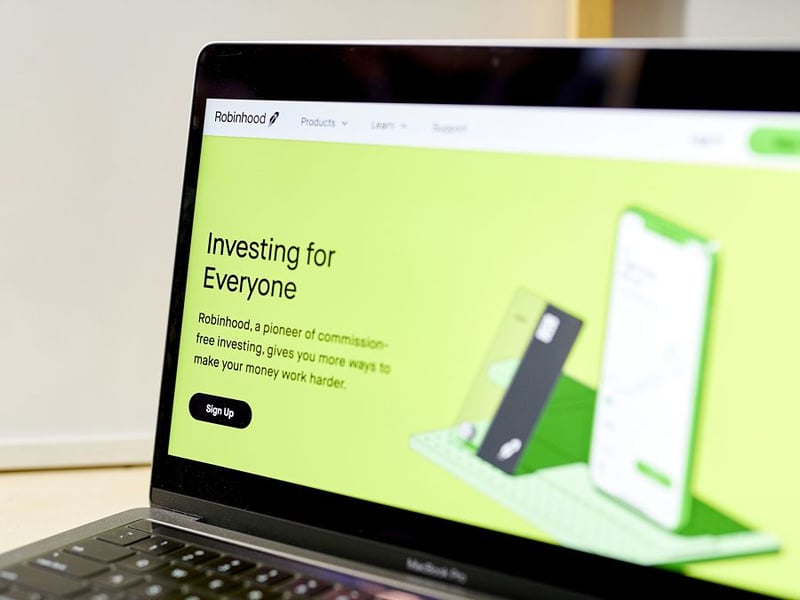

If you're fortunate enough to have $1 million in 401(k) or individual retirement account assets, Robinhood will pay you $30,000 for your business.
The company is going after rollover business by offering bonuses of 3 percent on assets moved into accounts through April, in addition to providing a 3 percent match on contributions. That offer, which started in mid-January, applies to its Robinhood Gold subscription-based service and has a five-year earnout.
It’s the latest in an escalating war of perks to win over new clients. A competitor, SoFi, has offered 2 percent matches on IRA contributions – but Robinhood’s 3 percent account bonus appears to be the more generous offer at the moment.
Whether that wins over clients is a big question, given the firm’s newness to the market relative to very well-established companies like Fidelity and Charles Schwab. Whether moving assets from a 401(k) to a business best known for its trading app will encourage more people to actively trade their retirement investments is another big question.
Data from consumer research firm Hearts & Wallets show that Robinhood has extremely high levels of brand recognition, with 40 percent of U.S. households being aware of the company. At the same time, the level of trust that customers have in Robinhood is lower than their level of trust in bigger financial services incumbents, said Laura Varas, CEO of Hearts & Wallets.
But a lot of people are trying Robinhood – about 6 percent of households have had accounts there, Varas noted. Even so, most customers are just dipping their toes in, investing very small amounts through the company, she said.
The account bonus offer “is them copying a well-known topic in financial services that has been around since the ’50s,” she said. “This is not new. You used to get a toaster when you opened a checking account.”
It’s not that people don’t like perks – they actually do, but not nearly as much as the features and services that companies provide, Varas said. When asked what motivated them to switch accounts from one financial services company to another, perks barely registered with customers, with 6 percent of people citing that as a major factor in their decision. By comparison, a third of people said they moved accounts for the sake of simplifying their finances, the Hearts & Wallets data show. The account bonuses are likely a way of nudging potential clients to get off the fence and actually sign up, Varas said.
So far, Robinhood has performed quite well relative to its competitors at converting awareness of its services to trials that involve money, she said. Yet her firm estimates that Robinhood retains about two-thirds of people who try it out – a figure that would alarm bigger companies but is nonetheless a show of success for a newer entrant that has reached out to so many people, Varas said.
“I still have serious concerns about some of Robinhood’s revenue models being a potential blocker to serious growth,” she said. “Can they become a responsible member of the financial services industry? The jury is still out on that.”
As of the third quarter, Robinhood Retirement represented more than $1 billion in assets across 400,000 accounts in less than a year following its launch, according to figures from the firm’s latest earnings report.
A company spokesperson referred questions about the size of its IRA business to earnings reports, as Robinhood is in a quiet period ahead of its annual report due later this month. The company did not immediately provide figures about what portion of IRA clients actively trade their accounts versus those who sign up for automated management or asset-allocation options.
Regardless, the idea of what amounts to an IRA match outside of the employer-sponsored retirement plan world is an interesting proposal, Crystal McKeon, chief compliance officer at TSA Wealth Management, said in an email.
“I love the idea, because it will likely encourage people to invest who might not have decided otherwise,” McKeon said. “From a due diligence standpoint, I usually prefer to wait until things have been a little more time-tested before jumping into something this new.”
Before customers sign up for any such accounts that offer bonuses, they should consider the level of fees, both at the account level and for the investment options available, she said. Customers should also weigh any restrictions, such as the five-year earnout that Robinhood has in place, she noted.
Further, check to see if the brokerages have a limited lineup of funds for the accounts with bonus offers, McKeon said. "Two drawbacks to having limited investment options is some mutual funds/ETFs can have high fees, and the returns could be lower on average than other funds in the same category.”

Relationships are key to our business but advisors are often slow to engage in specific activities designed to foster them.

Whichever path you go down, act now while you're still in control.

Pro-bitcoin professionals, however, say the cryptocurrency has ushered in change.

“LPL has evolved significantly over the last decade and still wants to scale up,” says one industry executive.

Survey findings from the Nationwide Retirement Institute offers pearls of planning wisdom from 60- to 65-year-olds, as well as insights into concerns.
Streamline your outreach with Aidentified's AI-driven solutions
This season’s market volatility: Positioning for rate relief, income growth and the AI rebound
